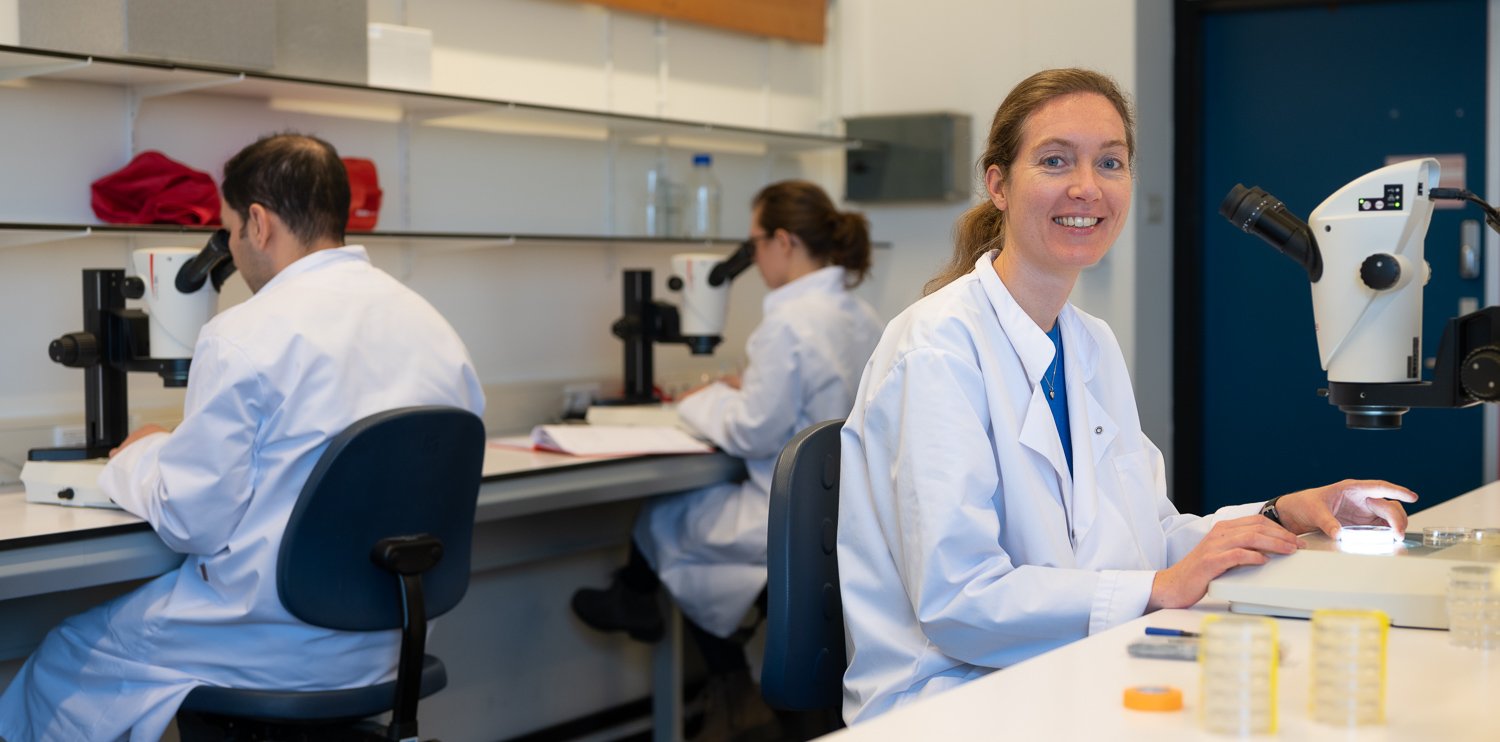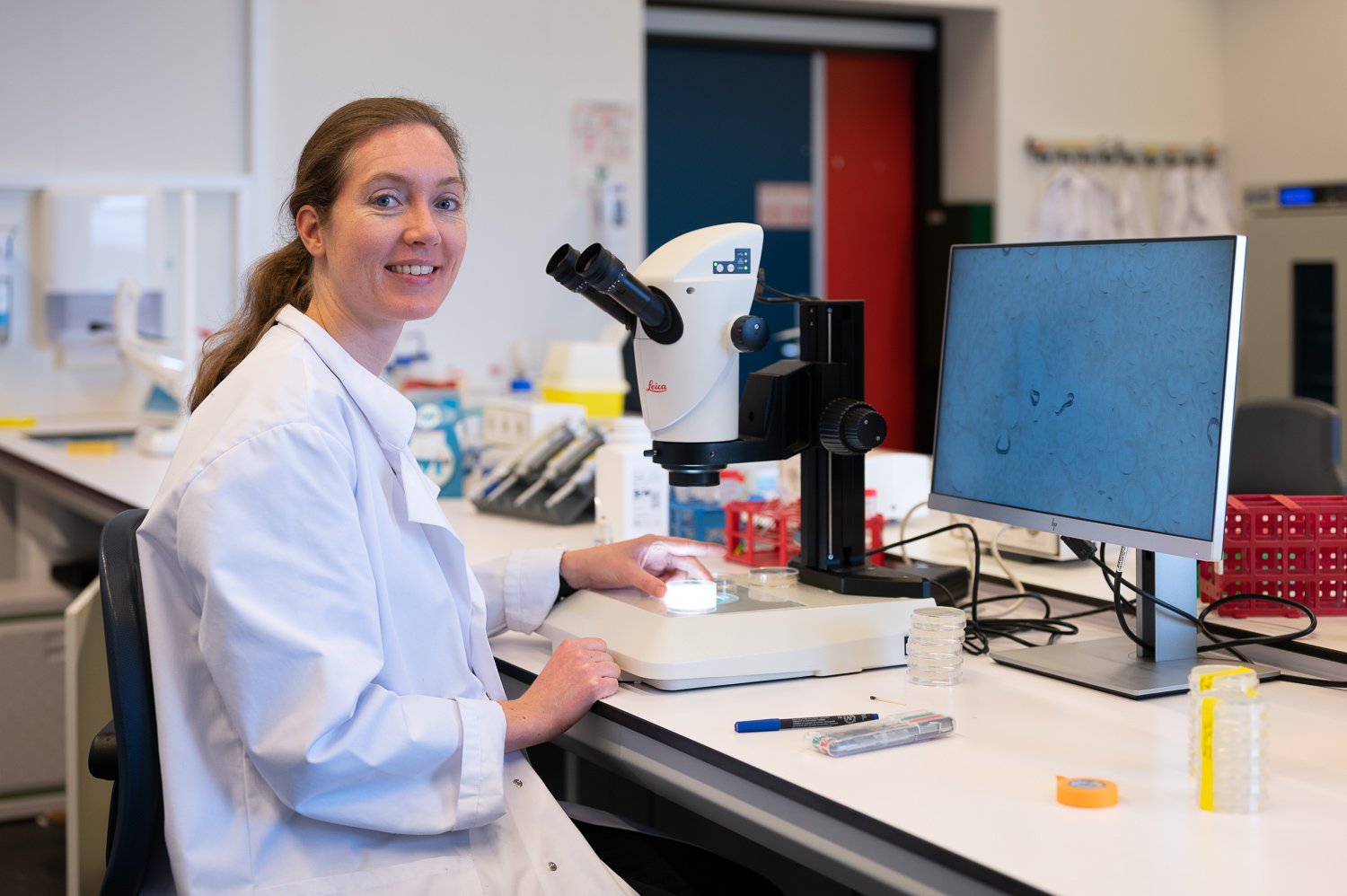"Data management is really important, also in view of the future of your own research"
The added value of a DMP
When she landed a research grant from NWO (Dutch Research Council), biochemist Tessa Sinnige had to write a Data Management Plan for the first time. Because she did not really know how to go about it, she asked for help from RDM Support. At first, Tessa Sinnige only had a few practical questions, but she gradually came to realise that she needed to take further steps in data management where her lab research was concerned. “Such a good thing I found this out now, and not in five years’ time.”
More and more research funders require the writing of a Data Management Plan (DMP). “The only thing was: I had never written such a plan before,” says Tessa Sinnige. ‘That is not something you learn during your degree programme. Also in my previous jobs I have never had to deal with such things. So I did not really know what was expected of me.”
Tessa made a scheme for her plan with the help of DMPonline, a tool for creating DMPs. “However, I did not entirely succeed on my own. Fortunately, the tool offers the option to ask for feedback from Utrecht University data management experts.”
In this way, Tessa came into contact with research data consultant Dafne Jansen of RDM Support. She reviewed the DMP of the researcher, in cooperation with Mercedes Beltrán, the faculty data steward. A data steward knows a lot about the type of data that researchers from the Faculty of Science are working with. Dafne Jansen gives advice on the main aspects, for instance about adding metadata, so that experiments can be easily retrieved, and the data steward checks the plan on specific and technical details.
What is a DMP?
Many research funders, including NWO, ask researchers receiving a grant to write a Data Management Plan before the start of their project. This is a document stating exactly what data they will collect during their project, how they will store and manage the data, and what happens with it afterwards. Tessa Sinnige: “That makes perfect sense, of course they want research money to be well spent. And if the collected data are stored in a careful way, it can be reused in the future by other researchers.”
Importance of data management
Tessa Sinnige received good feedback, but that in turn raised new questions. “Then Dafne advised me to go to one of the Walk-in Hours that RDM Support organises on the campus each week. As a researcher, you can just go there without having to make an appointment.”
At one of those weekly Walk-in Hours Tessa en Dafne struck up an extensive conversation. “That conversation opened my eyes to the actual importance of data management. I became aware of the fact that when setting up my lab I had never spent a single thought on protocols for data management. Our data consists mainly of microscopy files. But each team member had their own way of giving these files a name and putting them in folders.”
Such a DMP is typically a thing that makes you sigh because you already have so much on your plate. But now I realise that data management is really important, also in view of the future of your own research.
Master’s students
In Tessa Sinnige’s lab protocols were already used for the experiments the researchers carried out, she says. “As soon as new colleagues start their jobs in the lab, we teach them these protocols. I realised we needed something similar when it came to data management. So that as a result everyone organises their data in the same way.”
This is extra important, she emphasises, because in the Sinnige Lab there are many master’s students around. “Usually, the time they work for us is between six months and a year, while projects take much longer. It is often the case that researchers who collected data are gone around the time we start writing down our results. I need to be able to retrieve the data of all these different people. With everybody having their own system, it becomes an unworkable situation.”
FAIR data
Besides, Utrecht University has high ambitions in the field of open science, of which FAIR data is a part. This means that scientific data must be made Findable, Accessible, Interoperable and Reusable, says Tessa Sinnige. “I also had a question about that: it was not clear to me if ‘accessible’ means that your data must be made fully public. That is not the case, the thing is that the dataset must first be found (“Findable”) by other researchers. And if they want access, I must be able to provide it in a smart way (Accessible).”
This is a relief to Tessa Sinnige. “I like the fact that I can give other researchers a personal explanation before they might want to work with our data. If anything can be downloaded by anyone, you have no idea how others interpret and use your dataset.”
During the conversation, Tessa Sinnige also heard about Yoda, an application and service of the university where researchers can safely save, share, publish and store data for a long period of time. Tessa Sinnige: “That is a clever way to meet the FAIR principles. For instance, through Yoda you can give other researchers access to your data. RDM Support organises workshops on how to use this system. This would be a valuable next step for the researchers in my lab.”
I like the fact that I can give other researchers a personal explanation before they might want to work with our data. If anything can be downloaded by anyone, you have no idea how others interpret and use your dataset.
Advice to colleagues
By now, Tessa Sinnige’s DMP has been approved by NWO. Now she and her team are involved in creating the guidelines for data management in the lab. “We have come up with the idea to use the codes we use in our lab journals for this. Each researcher has their own code for each experiment, with their initials and a number. Now we save the data in folders with the same code. In this way we have a well-organised overview of the data per experiment.”
Although Tessa Sinnige regrets that only after two years since the start of her research group she is learning more about data management, at the same time she is happy she is catching up. “Better late than never,” she says laughing. “However, I would like to tell my fellow researchers: take data management seriously. Such a DMP is typically a thing that makes you sigh because it is one more thing on your already full plate But now I realise that data management is really important, also for the future of your own research.”
Moreover, she says, good data storage helps you to underpin your publications if any questions may be asked at a later stage. “Unfortunately, fraud in science still regularly occurs. If others may doubt your conclusions, you want to be able to show raw research data. Otherwise you might just as well pack your bags. But apart from that, you don’t want to be the scientist who discovers that half of the data is unfindable after years of research. You can prevent such a disaster by starting now to give data management careful thought.”
Sinnige Lab
Tessa Sinnige is tenure track assistant professor at Utrecht University. In a five-year track the university gives her the means and the people to set up her own lab. Her research is about aging. “You must think of particular diseases related to aging, such as Alzheimer’s, Parkinson’s and Huntington’s disease. Under the microscope we examine certain proteins that don’t behave as they should in these diseases. In our research, we use the roundworm C. elegans as model organism, because it is transparent and has a lifespan of only a couple of weeks.”



